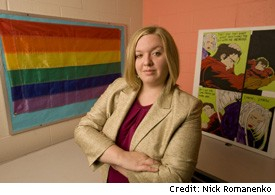Rutgers joins the ranks of schools that have implemented similar programs across the country

Jenny Kurtz is director of the Center for Social Justice Education and LGBT Communities, part of Student Affairs.
Rutgers Today: Why was this program necessary?
Kurtz: The program has been launched in recognition of the fact that traditional, same-sex room assignments are not ideal or appropriate for all students. In the last decade, there has been a steady rise of college students across the country requesting gender-neutral housing options, including students at Rutgers. Transgender students in particular thought it would make housing more equitable for people who identify as transgender and may not feel comfortable rooming with someone of the same legal sex. The program also increases options for all students to choose a roommate with whom they are compatible, regardless of gender.
Rutgers Today: Who wrote the policy?
Kurtz: Last semester, the Department of Residence Life, the Center for Social Justice Education and LGBT Communities, and numerous student leaders met several times to discuss ways to improve the residential experience for LGBTQ students. The decision to move forward with gender-neutral housing options was a result of these conversations. The Department of Residence Life then wrote the policy.
Rutgers Today: How will the pilot program work, where, and with how many people?
Kurtz: Students entering their sophomore, junior, or senior year may apply for the pilot program. They’ll be able to name their roommates – and they must name them. In New Brunswick. They can live in Rockoff Hall, where students reside in suites, have private bedrooms, and share a living room, kitchen, and single occupancy bathroom; Demarest on College Avenue; or New Gibbons on the Douglass Campus. Student applicants will not be assigned a random roommate. If the roommate they choose moves out, they may name another, specific roommate of any gender. If they do not choose a roommate, they will be assigned a new roommate of the same legal sex. In New Gibbons and in Demarest, students will have the option of using a gender-neutral, multi-stall restroom or a gender-specific, multi-stall restroom. Students who opt to share a room with someone of a different gender will still have the option of using a gender-specific restroom. No one will be required to live in a gender-neutral room or to use a gender-neutral restroom. On the Newark Campus, gender- neutral housing will take place in designated units in University Square and Talbott apartments.
Rutgers Today: Do the students have to be gay, lesbian, or transgender to take part? Will you prevent people who are romantically involved from living with each other?
Kurtz: We don’t ask students about their sexual orientation. Gender neutral housing is not intended for romantic couples. We do, however, respect and honor the privacy of our students, so current open housing procedures do not require students to disclose the reason for their roommate requests.
Rutgers Today: Do other universities and colleges have similar programs?
Kurtz: Yes, more than 50 institutions around the country. Right here in New Jersey, there are similar programs at Montclair State University, and Ramapo College and Princeton University. Nearby, Columbia University and Lehigh University have similar programs. They’ve had gender-neutral housing at the University of Pennsylvania since 2005. I’m not aware of any problems related to these programs at other institutions.
Media Contact: Ken Branson
732-932-7084, ext. 633
E-mail: kbranson@ur.rutgers.edu